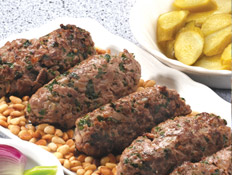One of the most awesome and cringe-worthy aspects of Hebrish is the Israeli love for bad Hebrew-English puns. For example, a pizza shop down the street from us is called פיצה מן, which is a mild pun on "man" and "manna" (as in the bread that rained from the sky for the Israelites in Sinai). "Manna" in Hebrew is pronounced "mon." To any American, the vowel sound in "man" and "mon" are not the same (unless the pizza joint is rostafarian, mon). But Israelis don't hear the difference between these vowels, so... welcome to the world of Hebrish punning, where "dead pun" takes on a whole new meaning.
Here are a few other classic bad Hebrish puns... what would you add to the list?
1. The Grand Canyon... which is a mall near Haifa. "Kenyon" is the Hebrew word for "mall." What better name for a big mall than "Grand Canyon"? What... you don't think a majestic natural wonder and a shopping center have anything in common? Well... but... kenyon! Canyon! Get it?
2. Zer4U, a chain of Israeli florists. If you don't get this one right away, first consider the fact that "zer" means "bouquet" in Hebrew. Then say "zer 4 U" really slowly and imagine yourself speaking English with a thick Israeli accent... get it? Get it? I'm zer for you!
3. Cup O'Joe, an Israeli coffee shop chain. (Thanks to Toby for pointing this one out in the comments of my post about Israelis not being able to read their own language!) Ok, so this one really only works if you read the name in Hebrew as well. In the English version, you see that the name is "cup o'Joe," which obviously refers to a cup of coffee (Joe). But in Hebrew, the vowels and consonants are ambiguous, so the name just as easily reads as "cuppa joe" or "cafe joe"-- and the word for "coffee" in Hebrew is "cafe." See how that works? This is a little more sophisticated than Grand Kenyon or Zer4U, but still fabulous.
4. Top Gan... an Israeli kindergarten. So the word for kindergarten (and garden) is "gan," and that old Tom Cruise movie was called "Top Gun," and in Hebrish "gan" and "gun" are the same sound.... hence this actual name for an Israeli daycare center. (That's not the actual picture-- it's what came up when I ran a google image search for "top gan." Based on its context, I'd say it's some kind of knock-off image from Indonesia.) Do you really want to imagine Tom Cruise giving you thumbs up as you drop little Itay off at gan? Does a Tom Cruise flight movie and a kindergarten have anything in common other than the word "gan"? No... but that never stopped Hebrew punsters! ("Top Gan" is also the name of a chain of garden stores: www.topgan.co.il.)
Update: here's the real picture of the outside of the Gan, and though it isn't as pretty as a young Tom Cruise, it's about as creepy-looking:
Here's one that "anonymous" brought up in the comments, and it was too good to leave out...

5. Oh Magash, a chain of pizza shops. (Magash=pan of pizza.) Priceless! (For the record, I'm going to continue to believe that "Paz Gas" is not an intentional pun.... please don't tell me otherwise. That would just be too depressing. www.pazgas.co.il)
This phenomenon is so widespread that I'm sure there are examples I'm missing. Have you encountered any bad Hebrish puns?




















































